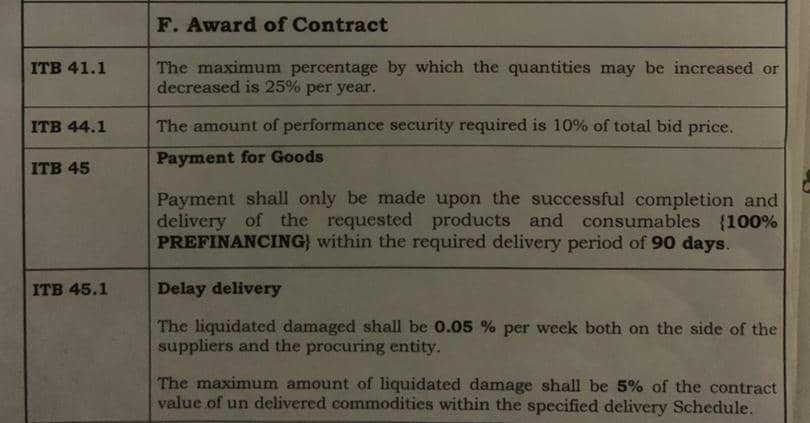
Dr Ahmadou Lamin Samateh, Minister of Health, The Gambia.
By Buba Gagigo
In the process of engaging companies for the procurement of Pharmaceuticals and other Health products on behalf of the Ministry of Health in The Gambia, the Gambia Health Ministry has deviated from the specified full pre-financing requirement outlined in the bidding document.
The Ministry of Health commenced the bidding process for the procurement of Pharmaceuticals and other health products on January 16, 2023, inviting eligible companies to participate. The bidding document explicitly mandated a one hundred percent pre-financing requirement.
Details from the bidding document obtained by Kerr Fatou indicate that the section on payment for goods explicitly states, “Payment shall only be made upon the successful completion and delivery of the requested products and consumables (100% PRE-FINANCING) within the stipulated 90-day delivery period.”

Portion of the bidding document that indicates 100% Pre-financing
Following the receipt of applications from various companies, the ministry awarded contracts to the following successful bidders: Atlantic, Gennichem, MPP Enterprise, Multi-G, Savorite, Shyben, Standard Solution, and Unimed.
An official notification from the Ministry of Health regarding the contract award to one of the selected companies stated, “We are pleased to announce the contract award for the procurement of Pharmaceuticals and other health products for 2023. This contract is structured as a 100% pre-financed arrangement, where all financial resources for the contract’s execution, including procurement and associated costs, will be provided by your organization.”
However, upon reviewing the contract documents obtained by Kerr Fatou, it appears that the 100% pre-financing claim is not reflected. Page seven of the contract document, under the section ‘Payment of foreign currency portion,’ outlines the payment terms as follows:
“(i) Advance Payment: Ten (20) percent of the contract price shall be paid within thirty (30) days of signing of the Contract and upon submission of a claim and a bank guarantee for equivalent amount valid until the Goods are delivered and in the form provided in the bidding documents or another form acceptable to the Purchaser.
“(ii) On Shipment: Eighty (70) percent of the Contract Price of the Goods shipped shall be paid through irrevocable confirmed letter of credit opened in favor of the Supplier in a bank in its country, upon submission of documents specified in GCC Clause 13.
“(iii) On Acceptance: Ten (10) percent of the Contract Price of Goods received shall be paid within thirty (30) days of receipt of the Goods upon submission of claim supported by the acceptance certificate issued by the Purchaser.”

The portion of the contract document that indicates 20% advance payment
The section on ‘Payment of Goods and services supplied from within the supplier’s country’ also mirrors the provisions under ‘Payment of foreign currency portion’ in the contract document from the Ministry of Health.
Landing Jaiteh, a Procurement officer at the Ministry of Health, acknowledged the disparity between the bidding document and the contract document. He clarified that the contract document is a draft sent to the Ministry of Justice for advice and to the awarded companies for review.”This contract document is a standard contract document, but we need to adjust it to fit our requirements. It’s a draft contract document, we haven’t signed the contract yet. The bidding document says a hundred percent Pre-financing. We were thinking internally about the ministry’s financial position and the need for these medical items, which are urgent. So the committee was thinking that since the ministry doesn’t have the financial capacity now,Paying them might be a problem for the ministry. And some bidders, in their reply to our notification, require certainty that if they deliver a hundred percent, the ministry is going to pay them. So the contract committee was thinking internally: What can we do to mitigate it if they deliver a hundred percent? Whether we will have the funds to pay them to fulfil our contractual agreement with them. So this is why we sent a draft contract document to Justice for them to advise on this thing. But then it is not final,” he said.
When inquired about the guidance provided by the Ministry of Justice, Mr. Jaiteh conveyed that they were instructed to adopt payment terms comprising 10%, 80%, and 10%. He elaborated that they apprised the Ministry of Justice about the GPPA regulation, highlighting that payments up to 20% could be made without GPPA approval, but anything exceeding that threshold would necessitate approval. Subsequently, the Ministry of Justice acquiesced to payment terms of 20%, 70%, and 10%. However, Mr. Jaiteh acknowledged that this decision was made by the ministry without any awareness of the bid terms.
Mr. Jaiteh stated that their decision not to sign the contract sent to the Ministry of Justice and the awarded companies was due, in part, to the pre-financing stipulation outlined in the bidding document.
“We know it is a major requirement in the bidding document, and others might not apply because of that. It is contradicting (the bidding document and the contract document). That’s why in our notification we bold it that it is a hundred percent Pre-financing,” he explained.
Additionally, Mr. Jaiteh clarified that respondents holding the majority of the contract have expressed in their feedback that prices have undergone significant changes since the bidding process. Internally, we have deliberated on how to address and accommodate their concerns.
When questioned about whether the hundred percent pre-financing requirement had deterred certain companies from applying, he affirmed, “Yes, initially it does because it was a major requirement.”
Responding to inquiries about the possibility of nepotism influencing the contract award, he asserted, “No, because this is an international bidding competition. So they applied, they were evaluated, and they were recommended for award.”
Samba Tambura, the Director of Compliance at the Gambia Public Procurement Authority (GPPA), provided insights to Kerr Fatou in his capacity as a procurement expert. He underscored that the views expressed in our interview align with widely accepted procurement regulations but do not represent the official position of the GPPA. Nevertheless, he emphasized the importance, according to procurement best practices, of refraining from modifying the rules mid-process.
He explained, “If there’s anything that indicates that there is Pre-financing as a condition, the expectation is that condition should be complied with to the letter. However, sometimes there are instances when the dynamics may change. Maybe there was something that necessitated the condition for pre-financing. So therefore, if the dynamic changed, then you have to call in for negotiation or extra approval if there was an approval given for the Pre-financing. Then you have to call in for negotiations to change that condition. But if that condition did not change, and it stands as Pre-financing as a condition, the law requires that you go by the condition to the letter,” he said.
When questioned about his knowledge of the Ministry of Health bidding document, which specifies a full pre-financing requirement for the procurement of pharmaceuticals and other medical items, Mr. Tambura stated that he is unaware of any information regarding a 20% advance payment as indicated in the contracts sent to the suppliers.
“What we can remember, I think there was pre-financing as a condition, and in that term, it means deliveries should be made before payments are effected. First, let me reiterate that this is news to me. We are not aware of any circulation of any contract documents to the most responsive bidders,” he said.
He also mentioned that the Ministry of Health and eight other institutions are currently granted the authority to carry out their procurement independently, without the necessity of obtaining prior approval from the GPPA.
“Secondly, the law also provides for what we call authorisation. Presently, as we speak, the Ministry of Health in addition to other eight institutions are already authorized. When I say they are authorized, it means the law has now allowed them to conduct their own procurement without need to seek prior approval from GPPA. I think it was effective around February, I cannot remember the exact date, but it is around six months since it was affective. Once you are authorized, it means you can conduct your own procurement without coming to GPPA for prior approval. So I am not very sure whether that’s what they are banking on or not, and I don’t want to speculate. However, in procurement, you should not change the rules of the game in the middle of the game,” he said.
Regarding concerns that the ministry may be unable to fulfil payments if all deliveries are directed to them, he suggested that the ministry should have explored alternatives instead of opting for advance payments.
“If that is their fear, and they want to change the condition for Pre-financing, I think they could have looked for better options. Because there is a reason why they said Pre-financing. So if you think the Pre-financing can no more hold, there should be a better options than advance payment. Because advance payment here means you are still exposing the whole procurement process to a risk. You are giving public money to suppliers who haven’t done anything. Most of the time advance payment are done against Bank guarantee I know, but however I will not advise the ministry or any other public institution to change a major requirement because Pre-financing in most of the cases is a major requirement,” he said.
He emphasized that such changes at this stage are generally viewed as a red flag and can be perceived as unfair treatment to suppliers who chose not to participate due to the pre-financing condition.
“It means, now the fact that you are Pre-financing as a condition, you have technically minus a lot of suppliers from participating. Now in the middle of the game, if you want to change that, you will not be fair to those suppliers who decided not to participate because of the Pre-financing as a condition. Those suppliers who did not participate because of the Pre-financing, at this stage, if they hear that, that Pre-financing is no more a condition they will consume it as unfair treatment for them,” he said.
Currently, the Ministry of Health is in the process of reviewing contract documents and has not yet concluded agreements with the selected bidders. Nevertheless, there are concerns about transparency and fairness due to the decision to deviate from the full pre-financing requirement. A representative from the health ministry expressed dissatisfaction, noting that a past contractor faced disapproval when seeking to modify the terms of a prefinance arrangement. This raises questions about why the ministry is considering changes in this particular case. It is imperative for the ministry to clarify the reasons behind this change and articulate its plans for addressing related risks.
